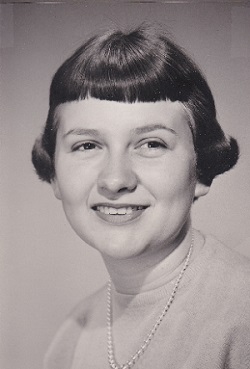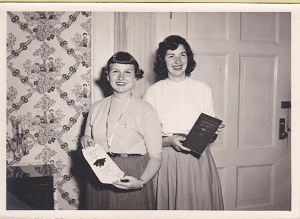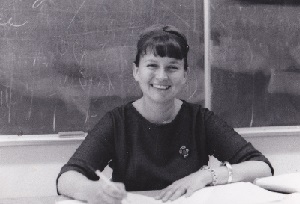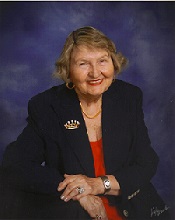BEVERLY ANN FITCH McCARTHY
BORN A FEMINIST, AROUND THE CLOCK ACTIVIST
 |
| a Junior at UC Berkeley – 1953 |
I was born Beverly Ann Fitch in St Louis Missouri in 1933, the only child of Clyde Fitch and Else Clara Marie Graf Fitch. Among other things my parents taught me the importance of work well done. “If you cannot do it right, do not do it at all, be courteous to adults, be on time, be honest, and tell the truth.”
I attended grammar school and Blewett High School, and had outstanding teachers. I loved school and participated in the school activities. I delivered the 8th grade commencement speech and learned the meaning of “A chain is as strong as its weakest link”, which has stuck with me my entire life . I also sang in the youth choir at church and attended summer Bible school.
My neighborhood had a large Jewish population, so I learned a lot about Jewish culture. We lived near Forest Park where I was introduced to the St. Louis Symphony Orchestra which began my love of classical music. I enjoyed the Art Museum, ice skated on the pond and rode my sled down what was known as Art Hill, and visited Charles Lindberg’s Memorial where I was enamored of the “Spirit of St. Louis” airplane.
In this era of racial injustices I think I was aware of racial inequities early on. St. Louis was not integrated and the only black person I knew was Sophie, our maid.
In 1948 my family moved to Venice, California - a very different environment, where I attended Junior High and High School, and continued my around the clock activities.
I was a member of the High School Drill Team, vice-president of the Science Club, secretary of the Cosmopolitan Club, founder of the Aphrodesians (sorority), Mariner Scout for three years, Senior Banquet Chair, wrote for the school newspaper, vice-chair of the Senior Ball, vice-president of the Delphian Scholarship Organization, of the Girls Athletic Association Board, chair of Girls League hospitality committee, and Chaplain of Rainbow Girls .
In high school I was a member of the Chatelaines, the 10th-11th grades girls’ honorary society, and president of the Venetian Ladies, a 12th grade honorary society. As a delegate of our Girls' League I attended a convention in Phoenix, Arizona for all the Girls' Leagues in Arizona and Southern California. Upon graduation I was elected to the Ephebian Society of Los Angeles, and became a Life Member of the California Scholastic Federation.
Outside of school I worked 15-20 hours a week, and participated in various debutante functions prior to my coming-out ball, a private community event .
Ever since the 10th grade I have earned my own spending money, bought some of my own clothes and books and paid for my tuitions through scholarships, etc. My parents were always there for me, but I liked making my own money. I’d opened my first bank account at the age of eight because I gave up my bedroom for WW II factory workers, and was given the rent money of $7. Being able to work gave me a sense of independence, responsibility, and an acquaintance with the working world.
In the fall of 1953 I entered the University of California Berkeley on an Alumni Scholarship. This was my first experience in living away from home for an extended period of time. Although I loved home and waited anxiously for all vacations, I was never homesick. I pledged a sorority and was elected president of my pledge class. Sorority life was an exciting experience however, I wish I could have had an opportunity to live in a women's group more representative of university students. Sororities tended to be more elitist.
My mother once said to me “You grow wherever you are planted”. I did not know a soul when I arrived on campus. In joining a sorority, I immediately had a home away from home. It was the right place for me at the time.
In 1955 I was a senior at Cal and still relatively naïve about politics. Active in student government, I moved to integrate the men’s and women’s football rooting sections. As president of the Associated Women Students, I was annoyed about the men’s rooting section attendees throwing their huge flash cards into the women’s rooting section. Those cards really hurt when they hit. In addition, the men had the best seats in the stadium. My motion failed miserably and I made the cover of the Daily Cal. This experience was probably the wakeup call that I was a feminist, a word not heard in campus conversations. Friends, more politically aware than I, presented me with posters of suffragettes carrying banners reading “Votes for Women.”
I knew nothing about the women’s struggle to get the vote. Women were rarely mentioned in history books. I was unaware of the lack of female representation in local, state and federal political office, and of how few women were teaching or holding administrative posts at Cal. Several women were teaching physical education as well as dance classes and I met weekly to talk about women’s issues with the Dean of Women, *Katherine Towle, the first woman to head the United States Marine Corps Women. I almost took a commission as a Marine Corps Officer, but decided to go to graduate school instead.
Busy as I was with college and work I found time for my favorite sports -- swimming, horseback riding, ice skating, sailing and tennis – and for dance – especially square and folk dancing and the jitterbug.
 |
| being tapped for Mortar Board at UC Berkeley 1955 |
During my years at high school and college I attended some 20 conventions which took me to NYC twice, San Francisco, Asilomar, and other facilities in California. Yet, with all this travel, the farthest I had ever been out of the United States was to the very northern area of Mexico.
My employment experiences have included day camp counselor, water front director, playground director, drug store clerk, delivery girl for a film company, private secretary, assistant bookkeeper, grocery store clerk for my parents, baby sitter, and many more.
In 1953 I received my AA from Los Angeles City College in psychology. At the University of California Berkeley I added physical education as a co-major, because eventually I wanted to go into student personnel work as I felt that in this phase of instruction teachers have more of an opportunity to associate with their students on a less formal basis. PE is very valuable in the moral, physical, social, and mental growth of all individuals - if properly taught. From the practical side education offered employment security, a good salary for women, and a sense of responsibility and accomplishment in educating the youth of America
In 1957 I earned a master’s degree from Stanford University with a major in education/student personnel and guidance. I attended Stanford on a fellowship and served as an intern on the Dean of Women’s Staff and was a resident assistant supervising 75 co-eds. During the summer quarter, as Student Body Vice-President I headed the campus police department and was in charge of the flicks -- and I had a secretary and was paid a salary!
One evening, in my dormitory, I met Russian President Alexander Kerensky who was president in 1917 before the Russian Revolution. He escaped to America and was studying at the Hoover Tower. It was an extraordinary experience to meet such an historical figure. I often wonder what Russia would have been like if the Revolution had never occurred and he had been allowed to remain as President.
After graduate school I went on to teach full-time at Monterey Peninsula College, Santa Barbara City College and San Jose City College.
In 1963 I moved to Stockton, California where I served as a counselor/instructor in Psychology, and Marriage and the Family at San Joaquin Delta College. I adopted daughter Elizabeth that year and son, Michael in 1964, and met John Linley McCarthy, a third generation Californian, where he was also working. On St Patrick’s Day in 1973 we married.
It was a powerful time. Betty Friedan had written The Feminine Mystique and in 1966 the National Organization for Women and the Women’s Liberation Movement ushered in the second wave of the feminist movement. In 1971 the National Women’s Political Caucus was formed, and NOW and the NWPC were working with the American Association of University Women (AAUW) to bring women into equal roles with men and for the passage of the Equal Rights Amendment.
During these years I marched several times for Planned Parenthood – and was informed by counter-protestors that I would burn in hell. I marched on National Secretary’s Day to protest the underpayment of secretaries I wrote a letter to the editor about sexual harassment and was invited to deliver a talk to several hundred Stockton Unified School District administrators. It was “standing room only. I let them have it, but I never received a thank-you note.
An entry into politics – the Stockton City Council and the Stockton Unified School District Board earned me a “thick hide.” I was called a “femiNazi,” derided for my liberal politics, and sniped at in the local press for advocating the singing of patriotic tunes in the classroom. I founded and chaired the San Joaquin County Commission on the Status of Women for 30 years. On behalf of the Commission I delivered a cactus to the all-male Yosemite Club (now defunct) for not admitting women. Later they invited me to join.
In 1973 the president of the Stockton Branch of AAUW asked me to be on her 1974 Board of Directors, and to head up the Committee on Women. I accepted reluctantly because of other time commitments, because she was a good friend, and she indicated there would not be a lot to do – just attend the board meetings. Little did I know how my life was to change. As I looked through the AAUW materials from Washington, DC. I read about Commissions for Women, consciousness raising groups and other feminist organizations. It all sounded so interesting and worthwhile.
 |
| a teacher at San Joaquin Delta College in Stockton, CA. in 1963 |
So I contacted Carol Benson, co-founder of the local NOW chapter, and asked for help getting the women in San Joaquin County together to discuss issues, e.g. comparable worth, pay equity, affirmative action, domestic violence, rape, alcoholism, reproductive freedom, education, gender equity, and a Talent Bank to encourage women to apply for boards and commissions. I soon realized that all issues were women’s issues. We invited every woman’s group in San Joaquin County to attend.
The turnout at the Library was phenomenal. Thus started the Women’s Council of San Joaquin County, soon to be renamed the San Joaquin County Commission on the Status of Women. The Commission later affiliated with the Association of California Commissions and the National Association of Commissions for Women. It is one of only two California women’s commissions not funded by a governmental entity.
Women in Stockton received very little positive public recognition. There was no female Stocktonian of the Year, no women in the men’s clubs, and no women in the Commercial Exchange Club or the Yosemite Club. So in 1975, “International Women’s Year,” the SJCCSW launched the first Susan B. Anthony Banquet Honoring San Joaquin County Women of Achievement. Fifty guests attended the banquet which was held at the University of the Pacific. Internationally recognized business woman Tillie Lewis received the first award.
In 1983, I was totally surprised when I received the Anthony award. SJCCSW remains politically non-partisan to this day, though we lobby/for and against bills that we perceive will have a profound effect on women and girls.
I’ve been president of the historic Philomathean Women’s Club; Stockton Chapter, American Association of University Women; Sunflower Presents, Inc. (performers who entertain convalescent home residents); Auxiliary to the county Child Abuse Prevention Council; the county Family Resource and Referral Employer-Supported Child Care Coalition; the Stockton Redevelopment Commission; and the county National Women’s Political Caucus. In 1973 I was the first woman to be elected president of the Stockton Symphony Association and served for four consecutive years.
For many years I chaired the Commission on the Status of Women. We put on 22 major conferences using the facilities of San Joaquin Delta College and the University of the Pacific. One year we wanted a woman lawyer to speak on wills and trusts, so I called the County Bar Association, and learned that there were exactly 12 women practicing law in the entire county! Since then we have sponsored 39 Susan B. Anthony Banquets honoring women of achievement, supported Affirmative Action when it was the law in California, worked on pay equity and comparable worth issues, and with Lincoln and Stockton School Districts to insure compliance with the new Title IX legislation, and through our Talent Bank encouraged women to apply for boards and commissions and, yes, even run for office. I never thought I would see the day that the Stockton City Council would have five women serving at the same time.
In 1985 at age 52 I officially retired, giving me more time to work for radical changes in society. I’ve marched for the United Farm Workers and continue personal boycotts of businesses that do not treat their employees correctly . Also active in non-political affairs, I‘ve headed the Stockton Opera Guild and chaired the Opera Association; the Civic Theatre League; the Symphony Association and the Alliance; and the Haggin Museum Department of Museum Travel Auxiliary. My husband and I were honored in 2010 when we received the Stockton Arts Commission's highest accolade, the STAR Award (Stockton Top Arts Recognition) for participation, support, and contributions to the arts.
It may all sound like overkill, but it was fun some of the times. I loved being the event coordinator in 1998 for the 150th Anniversary Celebration of Women in America, 1848-1998, with Jackie Speier, now the United States Representative for California’s 14th Congressional District as keynote speaker. Some of us came to the luncheon at Elkhorn Golf and Country Club dressed in ‘suffrage’ clothes and carrying placards.” In 1995 I co-chaired the Women’s Suffrage 75th Anniversary Celebration.
 I was elected to the Stockton City Council representing District 4 in 1990 and to the Stockton School Board in 2006, from which I recently retired. “I had the support of most of Port of Stockton’s board members, and I think that’s why I got elected. In 2010 I became chair of the school board wrapping up “four of the hardest years of my life.”
I was elected to the Stockton City Council representing District 4 in 1990 and to the Stockton School Board in 2006, from which I recently retired. “I had the support of most of Port of Stockton’s board members, and I think that’s why I got elected. In 2010 I became chair of the school board wrapping up “four of the hardest years of my life.”
In 2007 at an awards luncheon honoring county women at the Stockton Golf and Country Club, the Commission on the Status of Women honored Jacqui Ceballos, President of Veteran Feminists of America. Jacqui told us the story of the founding of VFA and received a standing ovation. She also bestowed medals to about fifty women activists.
Now much of my enthusiasm is directed to the national board of Veteran Feminists of America. I was elected to VFA’s board in 2010 and serve through this year. VFA brought second wave women activists back into the movement. I was thrilled to attend VFA’s latest conference, held in September in Los Angeles.
Currently at age 81, I am working on the 40th Susan B. Anthony Banquet Honoring San Joquin County Women of Achievement to be held on Susan’s birthday, February 15, 2015. During the past 40 years we have honored approximately 400 outstanding women. I continue to support feminist women running for office, and men who support feminist values. I also encourage women to apply for governmental boards and commissions through our Talent Bank. I still serve as treasurer of our local NOW chapter. Of course, I am working on the passage of the ERA and the ratification of CEDAW by the United States Senate and House of Representatives and continue to support the proposed Women’s History Museum in Washington, D.C. I have been blessed to be born a feminist.
For more about Beverly’s actions linley17@comcast.net
* Towle died- March 1, 1986
Contact Beverly: linley17@comcast.net
Comments: Jacqui Ceballos: jcvfa@aol.com